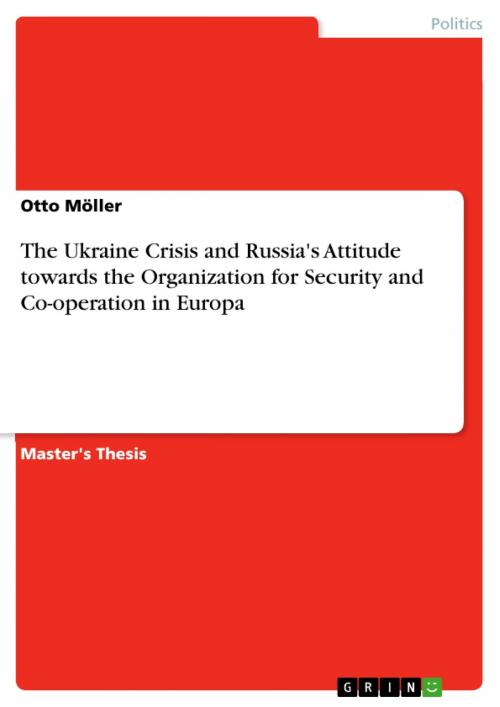The Ukraine Crisis and Russia's Attitude towards the Organization for Security and Co-operation in Europa
Nonfiction, Social & Cultural Studies, Political Science| Author: | Otto Möller | ISBN: | 9783668521315 |
| Publisher: | GRIN Verlag | Publication: | September 11, 2017 |
| Imprint: | GRIN Verlag | Language: | English |
| Author: | Otto Möller |
| ISBN: | 9783668521315 |
| Publisher: | GRIN Verlag |
| Publication: | September 11, 2017 |
| Imprint: | GRIN Verlag |
| Language: | English |
Master's Thesis from the year 2017 in the subject Politics - International Politics - Region: Russia, grade: 1,7, University of Kent (Brussels School of International Studies), language: English, abstract: The Ukraine crisis reached its peak point with the Russian annexation of the Crimea peninsula at the beginning of 2014. The annexation has since marked a turning point in the Russian-Western relations. Russia has disrespected international laws and norms, and thereby questioned the European order. The crisis reflects a significant shift in European geopolitics. It is a symptom amongst others of the long-term development in the Russian-Western relations. The crisis has exposed how vulnerable the post-Cold War European order is. The crisis management of the Weimar Triangle and Visegrad Group has not been fruitful. Indeed, the only forum which has succeeded in keeping the Russian-Western dialogue alive has been the Organization for Security and Co-operation in Europe (OSCE). It is the largest regional security organization in the world comprising fifty-seven member states from Europe, Northern America, and Asia. The organization bases its work on the shared values of its member states and aims to promote peace, security, and democracy. Since the organization is so central to the conflict, the research question aims to explain Russia's attitude towards the OSCE during the Ukraine crisis by asking: What was the Russian attitude towards the OSCE during the Ukraine crisis from 2013-2016? In support of the research question the paper will refer to Russia's behavior towards other states on the former Soviet territory in order to draw parallels to the approach towards Ukraine before 2013 to establish an understanding of Russia's general stances on the intergovernmental organization and the development of the relations.
Master's Thesis from the year 2017 in the subject Politics - International Politics - Region: Russia, grade: 1,7, University of Kent (Brussels School of International Studies), language: English, abstract: The Ukraine crisis reached its peak point with the Russian annexation of the Crimea peninsula at the beginning of 2014. The annexation has since marked a turning point in the Russian-Western relations. Russia has disrespected international laws and norms, and thereby questioned the European order. The crisis reflects a significant shift in European geopolitics. It is a symptom amongst others of the long-term development in the Russian-Western relations. The crisis has exposed how vulnerable the post-Cold War European order is. The crisis management of the Weimar Triangle and Visegrad Group has not been fruitful. Indeed, the only forum which has succeeded in keeping the Russian-Western dialogue alive has been the Organization for Security and Co-operation in Europe (OSCE). It is the largest regional security organization in the world comprising fifty-seven member states from Europe, Northern America, and Asia. The organization bases its work on the shared values of its member states and aims to promote peace, security, and democracy. Since the organization is so central to the conflict, the research question aims to explain Russia's attitude towards the OSCE during the Ukraine crisis by asking: What was the Russian attitude towards the OSCE during the Ukraine crisis from 2013-2016? In support of the research question the paper will refer to Russia's behavior towards other states on the former Soviet territory in order to draw parallels to the approach towards Ukraine before 2013 to establish an understanding of Russia's general stances on the intergovernmental organization and the development of the relations.















